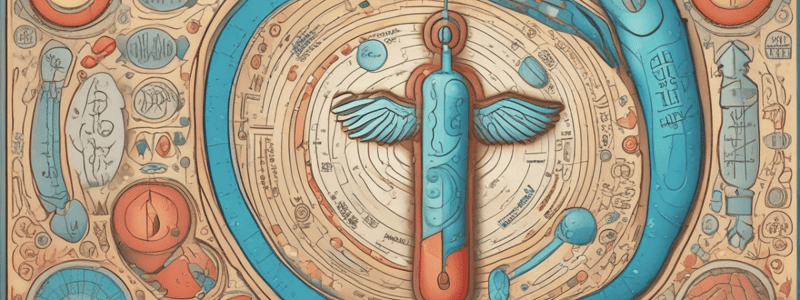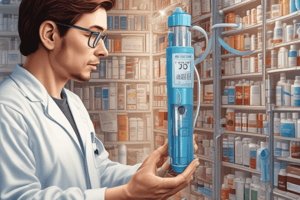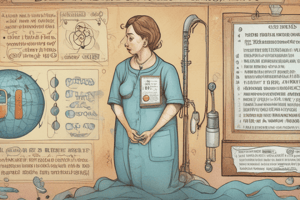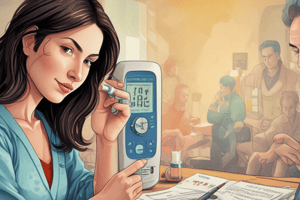Podcast
Questions and Answers
What is the primary challenge of titration in diabetes management?
What is the primary challenge of titration in diabetes management?
- Achieving good blood glucose control during sleep
- Balancing insulin doses with food intake and avoiding hypoglycemia (correct)
- Managing the psychological impact of living with diabetes
- Administering insulin injections at the correct time
What is the primary advantage of producing human insulin from altered bacteria or yeast?
What is the primary advantage of producing human insulin from altered bacteria or yeast?
- Reduced risk of hypoglycemia
- More purified and potentially cheaper insulin (correct)
- Increased production of insulin
- Improved insulin absorption rates
What type of insulin regimen is designed to mimic the natural physiological insulin response to food?
What type of insulin regimen is designed to mimic the natural physiological insulin response to food?
- Intermediate-acting insulin regimen
- Rapid-acting insulin analogue regimen
- Basal insulin regimen
- Basal bolus regimen (correct)
What is the most common method of insulin delivery?
What is the most common method of insulin delivery?
What is the year in which insulin therapy for Diabetes Mellitus was first discovered?
What is the year in which insulin therapy for Diabetes Mellitus was first discovered?
How many broad categories of insulin are there?
How many broad categories of insulin are there?
What is the primary consideration in matching mealtime dosing with food intake in insulin therapy?
What is the primary consideration in matching mealtime dosing with food intake in insulin therapy?
Why do some individuals with long-standing diabetes return to using new syringes and rotate injection sites?
Why do some individuals with long-standing diabetes return to using new syringes and rotate injection sites?
What is the most common acute adverse effect associated with insulin therapy?
What is the most common acute adverse effect associated with insulin therapy?
According to the UKPDS, what is the indication for insulin therapy in the majority of type 2 patients?
According to the UKPDS, what is the indication for insulin therapy in the majority of type 2 patients?
What is the optimal therapy for type 1 diabetes?
What is the optimal therapy for type 1 diabetes?
What is the prevailing view that needs to be challenged in insulin therapy?
What is the prevailing view that needs to be challenged in insulin therapy?
Why is it important to address the barriers that impede the full utilization of insulin therapy?
Why is it important to address the barriers that impede the full utilization of insulin therapy?
What is the primary benefit of early insulin treatment in type 2 diabetes?
What is the primary benefit of early insulin treatment in type 2 diabetes?
What is the significance of insulin therapy in preventing or delaying the development of further complications?
What is the significance of insulin therapy in preventing or delaying the development of further complications?
What is the potential benefit of adding thiazolidinediones or metformin to insulin treatment in type 2 diabetes?
What is the potential benefit of adding thiazolidinediones or metformin to insulin treatment in type 2 diabetes?
Study Notes
Insulin Therapy for Diabetes Mellitus
- Type 1 diabetes mellitus patients and some type 2 diabetes mellitus patients require multiple daily insulin injections or infusion pump therapy to manage their condition.
- Insulin titration is challenging due to the need to balance insulin doses with food intake, avoid hypoglycemia, and maintain good blood glucose control.
History of Insulin Therapy
- Insulin therapy for diabetes was first discovered in 1921 and has evolved to include various types of insulin.
- Genetic technology advancements allow for the production of human insulin from altered bacteria or yeast, making it potentially cheaper and more purified.
Types of Insulin
- There are six broad categories of insulin: pre-mixed insulin, long-acting insulins (Glargine and Detemir), intermediate-acting insulins (NPH), short-acting insulin, and rapid-acting analogues (Aspart, Lispro, and Glulisine).
- Insulins are categorized based on their onset, timing, and duration of action.
Insulin Delivery Methods
- The most common method of insulin delivery is injection, which can be uncomfortable and painful.
- Advancements in insulin delivery methods since the 1980s include smaller needles and syringes to reduce pain and predictability of injecting into muscle.
Barriers to Insulin Therapy
- Psychological resistance to needles and insulin injections is a significant barrier to their use, affecting both users and health professionals.
- Some individuals may have aversion to needles due to factors such as diminished visual acuity, tremors, cataracts, or retinopathy.
Importance of Insulin Therapy
- Insulin therapy is crucial for people with type 1 and type 2 diabetes to prevent or delay complications.
- Insulin therapy can prevent or delay the development of further complications, and early treatment can prevent subsequent MI, CVD events, and death.
Challenges and Future Directions
- The optimal therapy for type 1 diabetes should contain both prandial and basal insulin, while the regimen for type 2 diabetes is not as well defined.
- The increasing number of new insulin analogs and modes of delivery will provide more options to further customize hormone replacement therapy.
- Barriers to insulin therapy must be addressed at the patient, provider, and system level to promote successful insulin initiation and long-term maintenance.
Studying That Suits You
Use AI to generate personalized quizzes and flashcards to suit your learning preferences.
Description
Test your knowledge of diabetes management, including insulin regimens and titration, which is crucial for balancing insulin doses with food intake and avoiding hypoglycemia. Learn about the different approaches to controlling blood glucose in type 2 diabetes. This quiz is perfect for healthcare professionals and individuals living with diabetes.




